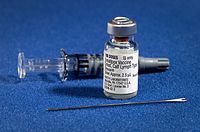
Photo from wikipedia
e20657 Background: Influenza vaccination is recommended by the CDC for cancer patients to reduce the risk of influenza-related complications. There is concern that the incidence of immune-related adverse events (irAEs)… Click to show full abstract
e20657 Background: Influenza vaccination is recommended by the CDC for cancer patients to reduce the risk of influenza-related complications. There is concern that the incidence of immune-related adverse events (irAEs) may be greater in vaccinated patients receiving immune checkpoint inhibitors (ICPI). We sought to interrogate if influenza vaccination in patients with NSCLC receiving ICPI therapy had an increased incidence of irAEs compared to non-vaccinated patients. Methods: We conducted a single-center retrospective analysis of patients with advanced NSCLC who received PD-1 or PD-L1 inhibitor monotherapy between 3/2015 – 12/2018. Influenza immunization records from both institutional and state-wide registries were obtained from 2014 -2019. Comparisons of adverse event incidence between flu vaccinated and control patients were tested using chi-square statistics. Results: 117 patients were included in our analysis, 33 (28%) were vaccinated during ICPI therapy, 19 (58%) received quadrivalent influenza vaccine, 13 (39%) received trivalent influenza vaccine and 1 (3%) was undetermined. 22 (67%) vaccinated patients had an irAE vs 53 (63%) patients who were not vaccinated during ICPI therapy (p = 0.720). 8 (24%) vaccinated patients had an irAE leading to discontinuation of therapy vs 12 (14%) patients who were not vaccinated during ICPI therapy (p = 0.198). The most frequent irAE in both groups was fatigue 16 (48%) vs 28 (33%) (p = 0.128). Notable irAEs included colitis (0 vs 1), pneumonitis (3 vs 3), hepatitis (1 vs 4) in vaccinated patients vs without vaccine, respectively. There were no statistically significant differences in baseline demographics between both groups including age, race, gender, tumor histology or ECOG performance status. Conclusions: Our study suggests that irAEs are not significantly increased with vaccination for influenza during ICPI therapy. However, there is a slight trend toward increased incidence of irAE warranting ICPI discontinuation for which further investigation is needed. Limitations of this study include a small sample size and inability to grade irAE retrospectively.
Journal Title: Journal of Clinical Oncology
Year Published: 2019
Link to full text (if available)
Share on Social Media: Sign Up to like & get
recommendations!